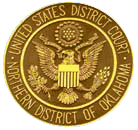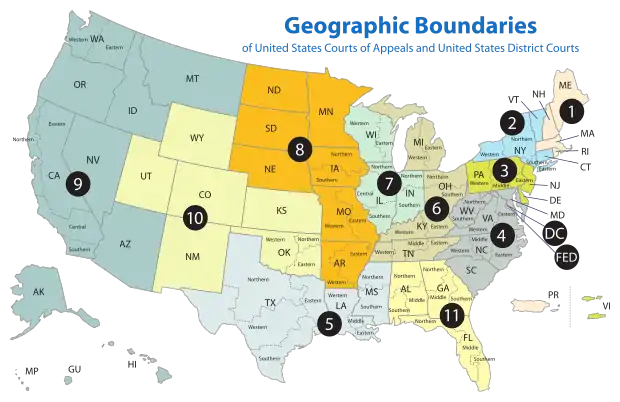United States District Court for the Northern District of Oklahoma
The United States District Court for the Northern District of Oklahoma (in case citations, N.D. Okla.) is a federal court in the Tenth Circuit (except for patent claims and claims against the U.S. government under the Tucker Act, which are appealed to the Federal Circuit).
| United States District Court for the Northern District of Oklahoma | |
|---|---|
| (N.D. Okla.) | |
 | |
| Location | Tulsa |
| Appeals to | Tenth Circuit |
| Established | February 16, 1925 |
| Judges | 4 |
| Chief Judge | John E. Dowdell |
| Officers of the court | |
| U.S. Attorney | R. Trent Shores |
| U.S. Marshal | Clayton D. Johnson |
| www | |
The District was established on February 16, 1925, with the transfer of a judgeship in the Eastern District to the newly established Northern district.[1]
Organization of the court
The United States District Court for the Northern District of Oklahoma is one of three federal judicial districts in Oklahoma.[2] Court for the District is held at Tulsa.
The court's jurisdiction comprises the following counties: Craig, Creek, Delaware, Mayes, Nowata, Osage, Ottawa, Pawnee, Rogers, Tulsa, and Washington.
The United States Attorney's Office for the Northern District of Oklahoma represents the United States in civil and criminal litigation in the court. The current United States Attorney for the Northern District of Oklahoma is R. Trent Shores.
Current judges
As of May 27, 2020:
| # | Title | Judge | Duty station | Born | Term of service | Appointed by | ||
|---|---|---|---|---|---|---|---|---|
| Active | Chief | Senior | ||||||
| 19 | Chief Judge | John E. Dowdell | Tulsa | 1955 | 2012–present | 2019–present | — | Obama |
| 16 | District Judge | Claire Eagan | Tulsa | 1950 | 2001–present | 2005–2012 | — | G.W. Bush |
| 18 | District Judge | Gregory Kent Frizzell | Tulsa | 1956 | 2007–present | 2012–2019 | — | G.W. Bush |
| 20 | District Judge | John F. Heil III[Note 1] | Tulsa | 1968 | 2020–present | — | — | Trump |
| 14 | Senior Judge | Terence C. Kern | Tulsa | 1944 | 1994–2010 | 1996–2003 | 2010–present | Clinton |
| 17 | Senior Judge | James H. Payne[Note 2] | inactive | 1941 | 2001–2017 | — | 2017–present | G.W. Bush |
- Judge Heil is jointly appointed to the Eastern, Northern, and Western Districts of Oklahoma.
- Judge Payne is jointly appointed to the Eastern, Northern, and Western Districts of Oklahoma.
Former judges
| # | Judge | State | Born–died | Active service | Chief Judge | Senior status | Appointed by | Reason for termination |
|---|---|---|---|---|---|---|---|---|
| 1 | Franklin Elmore Kennamer | OK | 1879–1960 | 1924–1940 | — | 1940–1960 | Coolidge | death |
| 2 | Alfred P. Murrah | OK | 1904–1975 | 1937–1940 | — | — | F. Roosevelt | elevation to 10th Cir. |
| 3 | Bower Slack Broaddus | OK | 1888–1949 | 1940–1949 | — | — | F. Roosevelt | death |
| 4 | Royce H. Savage | OK | 1904–1993 | 1940–1961 | 1949–1961 | — | F. Roosevelt | resignation |
| 5 | William Robert Wallace | OK | 1886–1960 | 1950–1960 | — | — | Truman | death |
| 6 | Luther L. Bohanon | OK | 1902–2003 | 1961–1974 | — | 1974–2003 | Kennedy | death |
| 7 | Frederick Alvin Daugherty | OK | 1914–2006 | 1961–1982[Note 1] | — | 1982–2006 | Kennedy | death |
| 8 | Allen Edward Barrow | OK | 1914–1979 | 1962–1979 | 1962–1979 | — | Kennedy | death |
| 9 | H. Dale Cook | OK | 1924–2008 | 1974–1992 | 1979–1992 | 1992–2008 | Ford | death |
| 10 | James O. Ellison | OK | 1929–2014 | 1979–1994 | 1992–1994 | 1994–2014 | Carter | death |
| 11 | Thomas Rutherford Brett | OK | 1931–2021 | 1979–1996 | 1994–1996 | 1996–2003 | Carter | retirement |
| 12 | David Lynn Russell | OK | 1942–present | 1981–1990 | — | — | Reagan | seat abolished |
| 13 | Michael Burrage | OK | 1950–present | 1994–2001 | — | — | Clinton | resignation |
| 15 | Sven Erik Holmes | OK | 1951–present | 1994–2005 | 2003–2005 | — | Clinton | resignation |
- Recess appointment; formally nominated on January 15, 1962, confirmed by the United States Senate on February 7, 1962, and received commission on February 17, 1962.
Chief judges
Chief judges have administrative responsibilities with respect to their district court. Unlike the Supreme Court, where one justice is specifically nominated to be chief, the office of chief judge rotates among the district court judges. To be chief, a judge must have been in active service on the court for at least one year, be under the age of 65, and have not previously served as chief judge. A vacancy is filled by the judge highest in seniority among the group of qualified judges. The chief judge serves for a term of seven years or until age 70, whichever occurs first. The age restrictions are waived if no members of the court would otherwise be qualified for the position.
When the office was created in 1948, the chief judge was the longest-serving judge who had not elected to retire on what has since 1958 been known as senior status or declined to serve as chief judge. After August 6, 1959, judges could not become or remain chief after turning 70 years old. The current rules have been in operation since October 1, 1982.
Succession of seats
|
|
|
|
| ||||||||||||||||||||||||||||||||||||||||||||||||||||||||||||||||||
See also
References
- U.S. District Courts of Oklahoma, Legislative history, Federal Judicial Center
- 28 U.S.C. § 116
